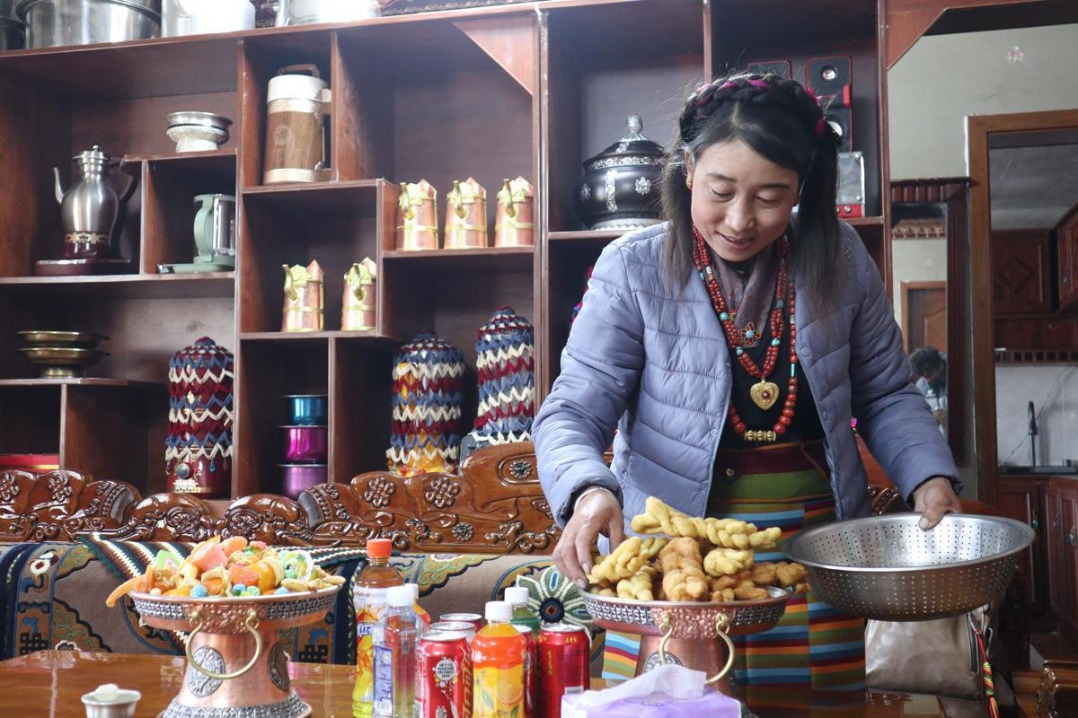Looking after leaders

Roles and responsibilities of doctors highlighted in book
The Health Guards Behind the Red Wall is a reprinted book, which is based on the verbal accounts of some physicians who took care of Chinese leaders, including the personal doctor of Mao Zedong, New China's founding father.
The death of a Chinese leader, Ren Bishi, from cerebral hemorrhage in October 1950, led to the creation of a special healthcare facility in the leadership compound of Zhongnanhai in Beijing.
| Nurse Guo Qinying (left) accompanied Deng Xiaoping on a walk with his grandson. Photos Provided to China Daily |
Fu Lianzhang, one of the few Western-trained doctors who served in the Red Army in the 1930s, was appointed the first head of the healthcare unit, which was tasked with taking care of about 93 leaders, including all members of the Central Committee of the Communist Party of China, and other top government officials.
At the beginning, the unit had limited medical staff and resources. Many physicians had to work both as doctors and nurses. The process of selecting medical personnel was also very strict - doctors and nurses not only needed top professional skills, but also had to be loyal to the government and the country.
The book quotes Fu as telling his staff: "The security guards keep leaders safe, and our responsibility is to protect the leaders' health. We are their health guards."
During their service in the healthcare facility, Fu and his colleagues complied with a set of confidentiality rules under which they couldn't associate with people outside their scope of work or reveal their work content even to their immediate families, and when their terms of service ended, they were not allowed to contact the leaders directly.
Because of the nature of their work, many physicians had established close personal friendships with the leaders they attended.

Wang Binhe served Chairman Mao from 1949-54, as his first official physician.
In the book, Wang recalls many stories and habits of the leader, such as Mao's preference for strong tea, his request of more coarse grains instead of rice and his favorite sport - swimming.
The simple lifestyle of Mao left a deep impression on Wang, according to the book.
Xu Fengsheng was a personal nurse to the country's first premier, Zhou Enlai, from 1964 until his death from cancer in 1976.
Xu recalls Zhou's health status was good before the "cultural revolution" (1966-76), but during that turbulent decade, Zhou became very busy, and his sleeping hours reduced drastically, which worsened his health.
Even when Zhou was diagnosed with cancer, he still kept working as much as he could, according to Xu's account in the book.
Later, Xu also served for Gu Mu, a vice-premier in the 1980s. During one of Gu's foreign visits in 1985, Xu noticed something wrong with Gu's eyes and urged him to take an examination once they returned to China. Gu might have lost his vision had the problem not been detected then.
The other medical workers featured in the book include Bu Zhaoxiang, the head pharmacist of the healthcare section; Weng Yongqing, who was the personal physician to General Zhu De; and Guo Qinying, who served Deng Xiaoping.
The book's first edition was published in 2011 by People's Publishing House and reprinted for a second time earlier this year.
The interviews of the physicians were done by Ma Zhixin, the founding manager of Red Wall Bio-Engineering, a Beijing-based company that produces nutrition products, and has contact with such physicians.
"There were around 50 physicians who served the country's first-generation leaders, and only around 30 are still alive," Ma says. "Their experiences are very precious and needed to be documented."
xingyi@chinadaily.com.cn
(China Daily Africa Weekly 07/17/2015 page30)
Today's Top News
- China's CPI up 0.8% in Dec
- Report slams Tokyo's nuclear weapon aims
- Nation's crime rate touched record low last year
- Nation's space program records stellar year of firsts
- Top Party leadership hears series of annual work reports
- 'Great ship' of shared future sails onward































